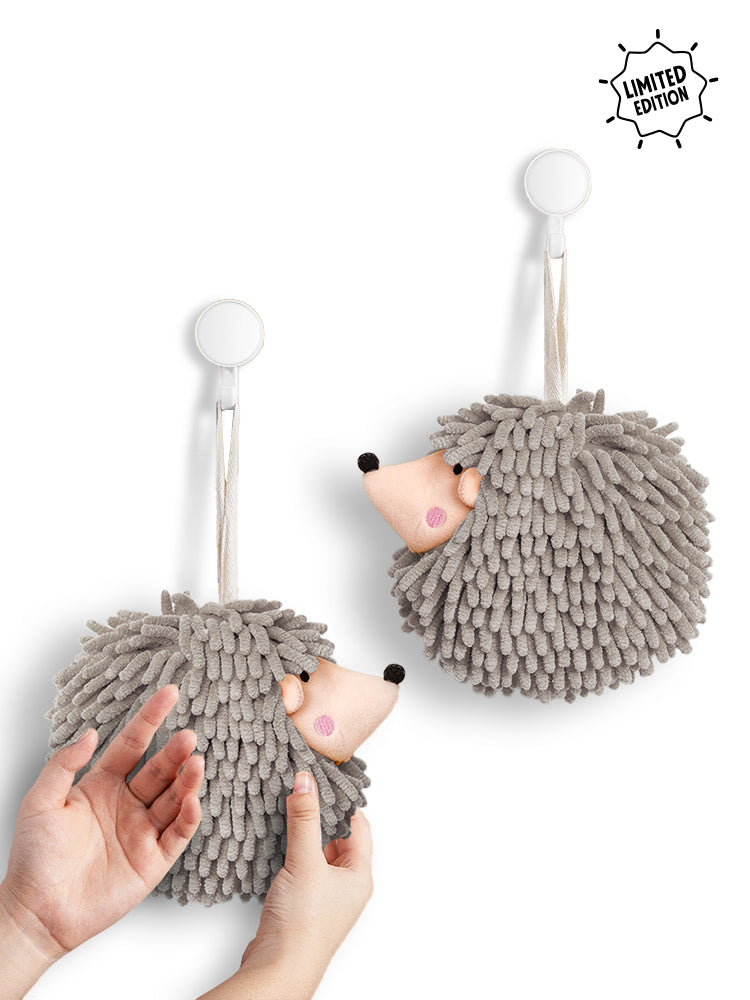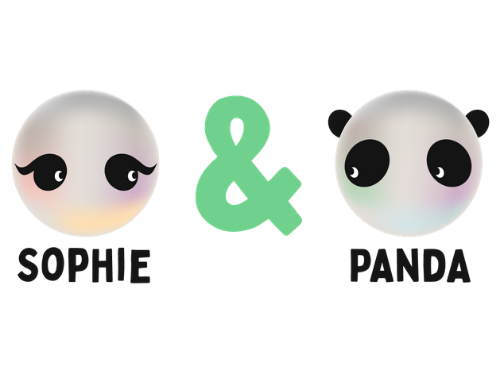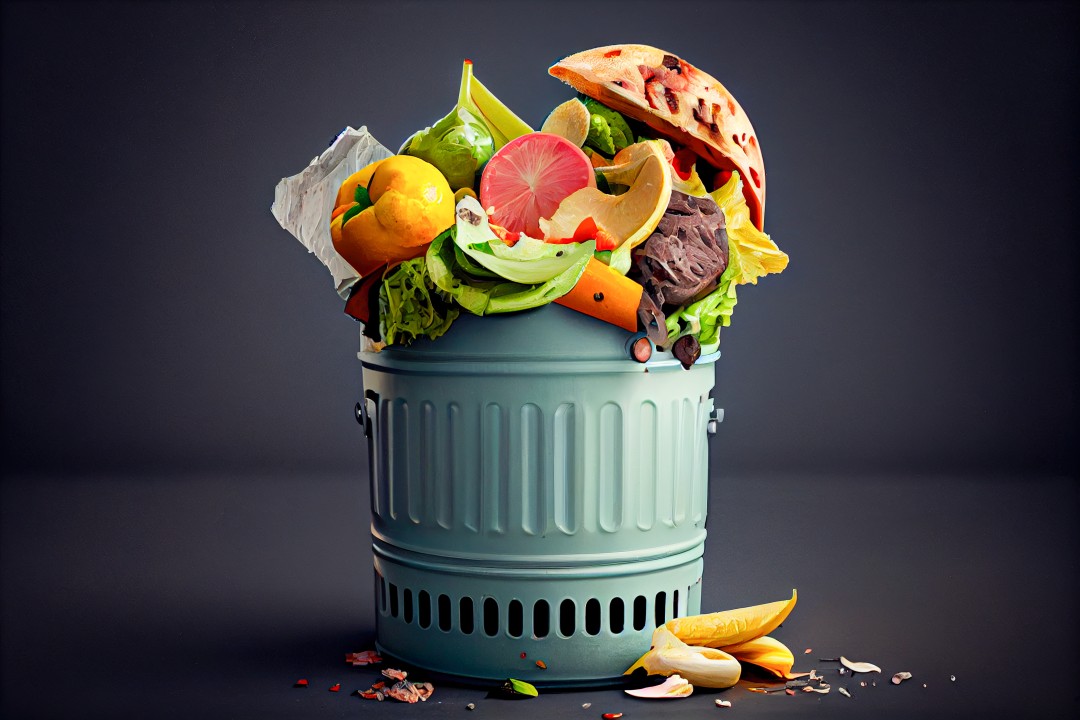
It feels great to do your part in helping the environment, including filling up your recycling bin for collection every week. But if you toss items that cannot be recycled, while your intentions are good, those items may contaminate the entire load — in the worst-case scenario sending it all to the landfill.
Fortunately, you can get around this by getting up to speed on non-recyclable items. In the guide that follows, you’ll find several of the most common things that cannot be recycled.
4 Things You Can't Recycle
Avoid tossing the following non-recyclable items into your curbside recycling bin at all costs.
1. Plastic Bags
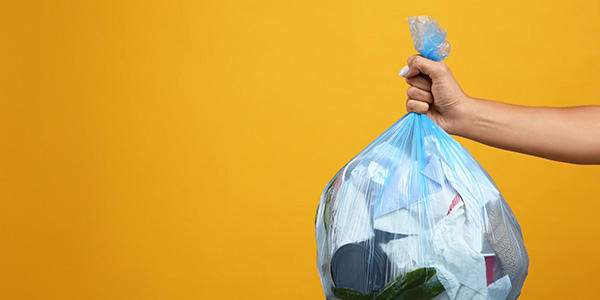
Plastic bag recycling is a bit tricky. While you can recycle them — they cannot go in most curbside recycling bins.
You should also avoid bagging your recyclables in plastic before you throw them in your bin. The good news is changes are coming that may allow for curbside plastic bag recycling soon.
“There is a shift occurring and a higher level of demand for recycled films and bags. MRFs around the country are beginning to include plastic film and bag collection in their recyclables, and technology to handle these streams is being added to current operations to increase collection rates,” Brewer says.
Whatever you do, don’t toss plastic bags in your trash. Collect them until you can drop them off at a collection site, which can often be found near the front of grocery stores. “If your current curbside collection does not allow for plastic bags, you can check locally for convenient, nearby drop-off locations,” Brewer notes. “Most large retailers have drop-off centers for plastic film and bags, amongst other items.”
If you’re feeling creative, you can also learn how to turn a plastic bag into a kite or try your hand at one of these DIY plastic bag project ideas.
What Plastics Cannot Be Recycled?
All plastic containers are labeled with a resin identification code (RIC) that tells you which kind of plastic it is. You can find the RIC near the chasing arrow recycling symbol.
Plastics assigned number 1 — polyethylene terephthalate (PETE), such as water bottles, soda bottles and peanut butter jars — or 2 — high-density polyethylene (HDPE), such as milk jugs, shampoo bottles and laundry detergent containers, as well as 5-gallon buckets — are typically accepted in curbside recycling. A good rule of thumb is if the neck of the container is narrower than the base, it can usually be recycled.
But numbers 3 to 7, which include the following plastic goods, are usually non-recyclable items:
- Squeeze bottles
- Coffee cup lids
- Styrofoam cups
- To-go containers
- Yogurt containers
- Kitty litter buckets
- Laundry baskets
- Straws
- Plastic solo cups
- Toys
- Egg cartons made of plastic or Styrofoam
- Sippy cups
If you’ve refilled a typically recyclable plastic container, such as a milk jug, with something else, this may also make it non-recyclable.
“For example,” Brewer says, “a consumer will use a milk jug to collect drained oil during an oil change. It is very difficult for the recycler to identify what contaminant is inside of the reused plastic product and any hazardous material could contaminate an entire batch of recycled material. These scenarios cause issues in the recycling stream when the materials are washed and re-pelletized.”
If you’re still unsure, contact your local recycler to find out what plastics cannot be recycled in your area.
2. Many Types of Food Packaging
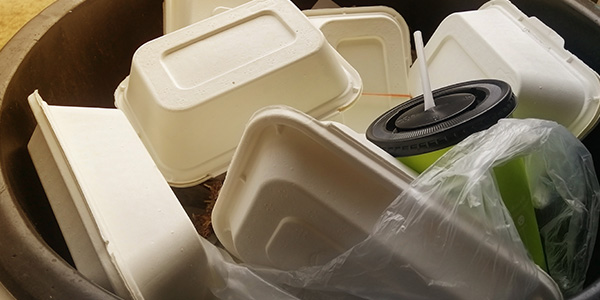
You can’t recycle anything contaminated with food scraps, even if it’s paper or cardboard. The U.S. Environmental Protection Agency suggests, “‘Spatula-clean’ is clean enough to recycle!”
We know you’re probably wondering, “Are pizza boxes recyclable?” The answer is yes — as long as there isn’t food stuck to them. Some grease is OK but make sure to remove any stuck-on cheese.
Most curbside recyclers don’t accept:
- Polystyrene foam (styrofoam)
- Plastic utensils
- Cups with wax or plastic coatings, such as coated paper coffee cups
- Potato chip bags
3. Most Electronics
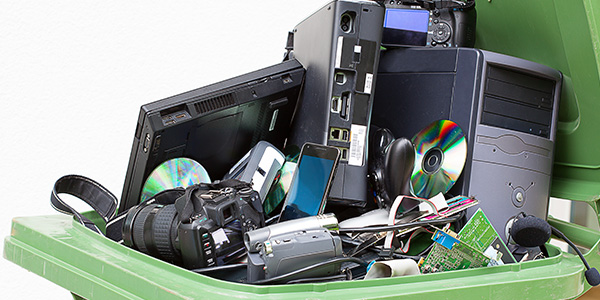
Recycling electronics in your curbside bin is a major no-no. But similar to plastic bags, while recycling electronics curbside is a no-go, they can — and should — be recycled elsewhere. Because electronics often contain hazardous materials, they’re also typically prohibited in landfills. To dispose of them properly you’ll need to find an electronics recycling program in your area.
Review our Electronics Disposal Guide for tips on where you can donate or recycle electronics such as televisions, computers, cellphones, cameras, gaming consoles and more.
4. Food Waste
Tempted to toss an apple core or a half-eaten box of popcorn into your recycling bin? Or maybe a brown paper bag full of grass clippings? Don’t do it.
“[Another] item that cannot be added to a curbside stream are compostable products,” Brewer says. “These materials require specific conditions found at composting facilities to biodegrade fully.”
More U.S. cities are adding curbside composting to their regular trash pickups. This is where your organic waste should go if it’s offered in your area. If not, you’re in luck, because building your own compost bin is surprisingly simple.
More Things You Can’t Recycle
Many non-recyclable items don’t fit neatly into a category, making it difficult to figure out what’s allowed and what’s not. If in doubt contact your local recycler, but keep these general recycling rules in mind too.
- Flexible packaging — If the package is soft and pliable, like a potato chip bag or juice pouch, it’s made from multiple materials and can’t be recycled.
- Long items that tangle easily — Garden hoses, Christmas lights, leashes and chains have one thing in common. If they make it to a recycling facility, they can seriously damage equipment and injure workers.
- Textiles — Many curbside recycling programs don’t take textiles, such as clothing, curtains and sleeping bags. If you have fabric items in good condition, consider donating them. Even if they’re not usable, many communities offer specialized textile recycling services.
- Scrap metal — Most scrap metal is recyclable — just not in your curbside bin. In many cases, you can recycle scrap metal for cash payments at a local scrap yard.
- Shredded or colored paper —While shredded paper is technically recyclable, it’s too small to sort and may get stuck in machinery or end up on the floor at the processing center. You may be able to find a local recycling resource that accepts shredded paper or you can use it in your homemade compost bin. Colored paper isn’t accepted because it will release its color, contaminating other items.
Sources:
- All photos used in this blogpost are sourced from the internet, and the rights belong to their respective owners
- Surprising Things You Can’t Recycle. (n.d.). https://www.budgetdumpster.com/blog/things-you-cannot-recycle
